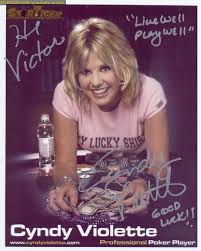In Stud High you have to pay attention to having a decent starting hand, calculating pot odds thoroughly, reading your opponents and finding the right spot for stealing the bring in and the antes. The following example was a real game I played in.
I was sitting on the big blind with 8-7 off suit. There was a very quiet player in the big blind who raised all in for $80. I made the call and put in $130, knowing that if I did win the hand that I would be up a lot more than just the blinds.
The flop came down Q-7-2 rainbow. vioepoker.com At this point, I kind of felt like the odds were against me not only being able to get a goodly sized pot, but also making a decent enough hand to be able to steal the blinds. I checked knowing that the player in first position was going to bet very aggressively later and I had to protect the hand my stack was marching to.

A player to my left went all in for $200, another player beside me called, and the player on the button only called as well. The blinds were $50-$50, so I had about a 20% chance of winning the hand or worse, lose the entire stack. But I still had enough to chase away those two players.
I refined my semi-bluff at this point and felt it had better chances to win. I checked for the right time to try and steal the blinds and the bring in. This gave me the edge on going all in because I had the chip lead. Unless, I won the hand, I wouldn’t have been able to get those chips to build my stack later.
I started watching the players at the table and after a while, I noticed that nobody was betting aggressively pre-flop. They were sitting around, waiting for their good hands to go in. There was no nerve, there was no bluffing going on. Everybody played just waiting for their good hands. This is when I figured they would call me with any hand.
By this time, several players were folding their hand as fast as they could, but there was a very good reason. They were scared of getting caught. These were the exact type of players that I was after. I decided to try a little play on the button and raised to $300. Everyone folded but me and that’s when I got the best of them.
Knowing that I had them beat, I dropped out of the hand and tried to make a strategic escape. I straightened my strategy and played very aggressive out of position. In position, you can practically run your opponent out of the tournament. Once you are in position, there’s nothing you can do from there. So I raised, they folded, and I doubled up.
This is when the game changed from tight to aggressive. I had accomplished what I set out to accomplish and then some. I had started out as a tight passive player, and hots tried to kill the button. I was on a hot streak at that point, and it seemed like I might get the button soon. But, just as quickly, it would turn and I would get killed and be sent home.
Once I became familiar with the aggressive poker strategy, I started to win bigger pots. At first, I wasn’t very successful, consistently getting bullied out of pots. But I began to develop a strategy on how to play aggressive, and what it would take to win.
Tips On Winning At The New Table
Now, if you want to win at a new table, the main thing to learn is to play aggressive. It seems that many players new to playing poker don’t quite understand the aggressiveness required to win. They try to limp in and see if they hit a good hand, which doesn’t work. They try to see flops with low odds, and while they may occasionally win, it isn’t typically how they win.
New poker players will often hone their poker skills by playing on the Internet for awhile, before jumping into a live game. The payouts are better online, and the games are much softer. You will not getabbledbyfish so easily. In addition, the ability to act never fails.
However, if you do wish to win at poker, and make some money, the strategy you want to use is more important than the location of your table. You want to play aggressive with a wide range of hands.
When you play aggressive, you want to have a good idea of the opponents you are competing against. From experience, you want to identify three types of opponents:
The lazy fish, the maniac, and the bloodhound. These are the players you want to spokes at. They will call you if they have a decent hand, but will seldom let you push them around.